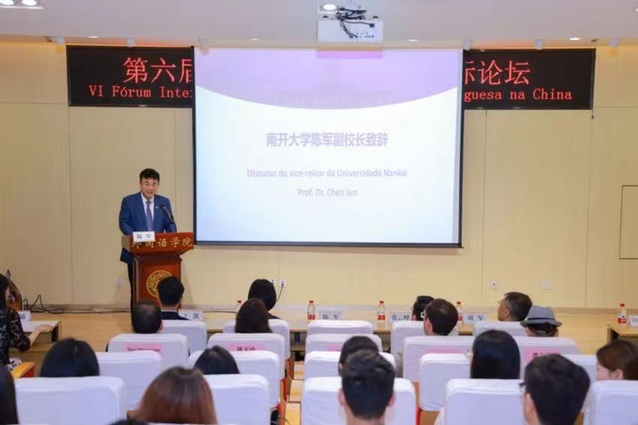
On July 5th, the opening ceremony of the 6th International Forum on Portuguese Language Teaching in China took place at Nankai University. The event was attended by Nankai University’s Vice-Principal and academician of the Chinese Academy of Sciences, Dr. Chen Jun, as well as Vice-Rector of Macao Polytechnic University, Dr. Vivian Lin, both of whom delivered speeches. More than 50 experts and scholars from around the world participated in the forum, engaging in discussions on Portuguese language teaching and research in China and contributing to the development of Portuguese education catering to Chinese students.
Dr. Chen Jun extended a warm welcome to the attendees on behalf of the university. He highlighted that Nankai University is implementing an integrated talent cultivating mode. In the context of the Belt and Road Initiative, the university aims to cultivate high-level talents proficient in key languages such as Portuguese. They are expected to possess advanced language skills, a comprehensive knowledge base, and a broad international horizon, enabling them to participate in global competition and cooperation. He expressed hope that this forum would serve as an opportunity to enhance cooperation and communication among various parties, fostering the development of versatile, internationally competent foreign language professionals.
Dr. Vivian Lin stated that as a co-organizer of the forum, Macao Polytechnic University looks forward to working with all parties involved to broaden areas of exchange, deepen levels of cooperation, and jointly promote the advancement of Portuguese language teaching into a new age, thereby contributing to the high-quality development of Portuguese language education in China.
The International Forum on Portuguese Language Teaching in China, first held in 2011, takes place every two years. This year’s forum received support from Diacrítica, a comprehensive high-level international journal published by the University of Minho. During the forum, experts and scholars will conduct discussions on topics such as the value of the Portuguese language in the 21st century, cultural dialogue concerning Portuguese language teaching in China, and Brazilian studies on China, thus fostering cooperation and exchange.



